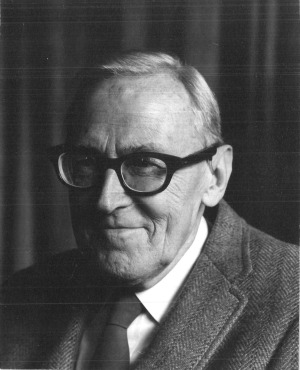Post contributed by Elizabeth Dunn, Research Services Librarian
The Rubenstein Library’s Economists’ Papers Archive attracts numerous scholars from around the globe. This summer, it has also attracted one very special scholar: rising eighth grader Benjamin Knight. Nearly every day, he has been a quiet presence in our reading room, working his way diligently through boxes of our Oskar Morgenstern Papers.
Although we often welcome even very small children whose families make a pilgrimage to see our first edition Book of Mormon, Benjamin is the youngest serious researcher anyone can remember. Those of us on the Research Services staff found his interest in this important Austrian American economist intriguing. He was kind enough to take time out of his work to grant me an interview.

Photo by Elizabeth Dunn.
Asked how he became interested in Morgenstern, Benjamin replied that he had read an article about Von Neumann and Morgenstern. (The two economists overlapped at the Institute for Advanced Study in Princeton from 1938 until 1954. Morgenstern, an economist trained at the University of Vienna and influenced by Carl Menger, was grappling with the challenges of economic prediction. He knew John Von Neumann’s 1928 paper on the theory of games and the two collaborated on their influential 1944 book, Theory of Games and Economic Behavior.1) Benjamin was pleased to discover that we hold the Morgenstern Papers, and is using them to tease out the sources of Morgenstern’s key ideas: the University of Vienna or Princeton. More generally, he is interested in the application of game theory to the analysis of social interactions and political decision-making. Some of the Morgenstern documents are hand-written in German. Asked whether those were challenging, Benjamin replied that the handwriting is a little problematic, but translating the German, which he has never studied, is more difficult.
Benjamin has many other interests besides game theory. He represented Brazil (and, with partner Claire Thananopavarn, won Best Delegation) in the Eighth Annual Chapel Hill-Carrboro Middle School Model United Nations Conference in April. He was part of the Smith team at this year’s Middle School National Academic Quiz Championship Tournament and placed among the top twenty-five competitors in the 2017 Wake Technical Community College Regional State Math Contest. When not competing, Benjamin enjoys reading fiction, history, and politics.
Benjamin comes by his interest in social and political analysis naturally. His mother, cultural anthropologist Margaret “Lou” Brown, is Senior Research Scholar and Director of Programs at Duke University’s Forum for Scholars and Publics. His father Jack Knight is Frederic Cleaveland Professor of Law and Political Science and holds a joint appointment in Duke’s School of Law and Trinity College of Arts and Sciences. Benjamin has not yet decided on a particular career path, but all of us in the Rubenstein are happy that he found us and look forward to following his continued successes.



